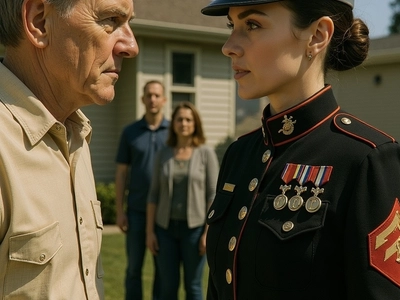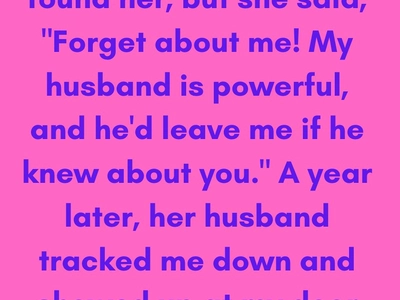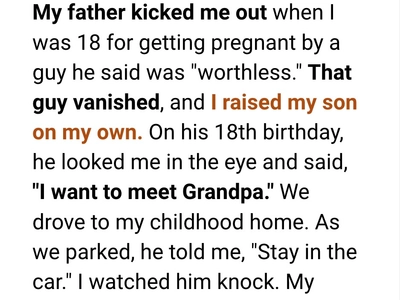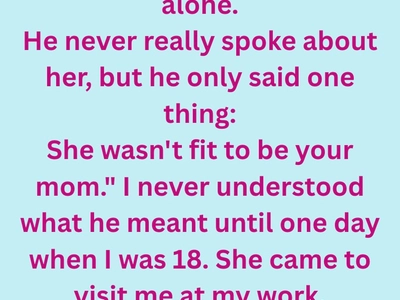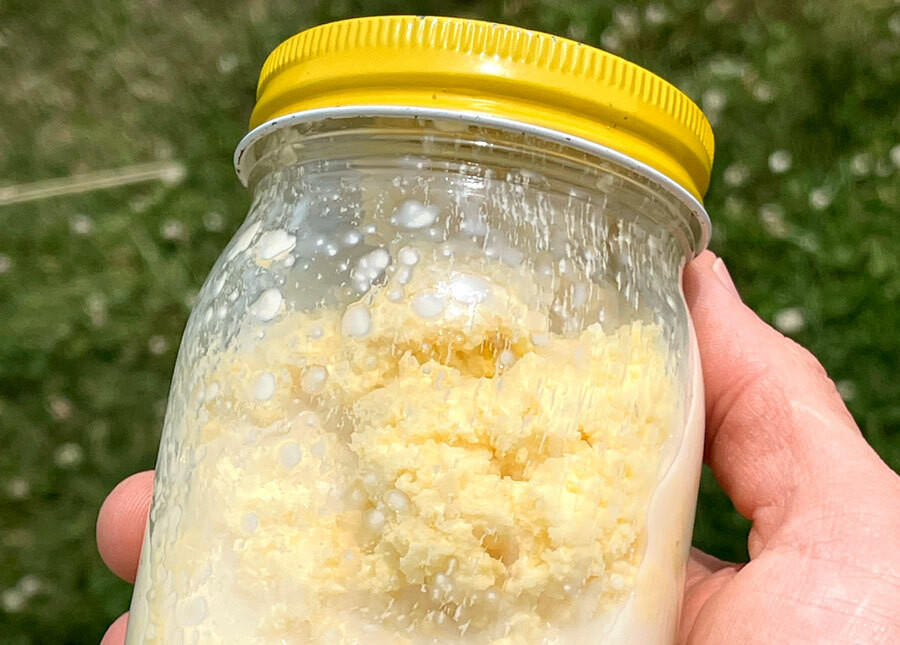“Get Out of My House,” Her Father Told Her at 19 — Twenty Years Later, He Was the One Left Speechless
At nineteen, she stood on the porch of her parents’ house with a duffel bag slung over her shoulder and a baby quietly stirring inside her. The November wind bit at her cheeks, but the coldness that hurt the most came from her father’s eyes. He looked at her like she was already gone — a stranger on his doorstep.
“You made your choice. Live with it.”
The door shut with a final, echoing thud. Through the window, she caught one last glimpse of her mother, hands trembling, tears streaking her face. Her brother turned away, his jaw tight. No one said another word.
She could have broken right there — the chill, the fear, the sting of rejection. But something inside her refused to collapse. She tightened her grip on her bag and walked into the dark.
The road ahead was uncertain, but she decided she would make it hers.
The first apartment she found was barely more than a room — cracked walls, a heater that rattled like it was coughing up dust, and windows that leaked every gust of winter. Still, it was hers. A beginning.
She worked mornings at a diner, wiping down tables that smelled of burnt coffee and syrup. Nights, she cleaned offices long after the lights went out, pushing a mop while her back ached and her feet throbbed. Her body hurt, but her resolve didn’t. Every dollar saved, every hour endured — it all meant one thing: she and her child would survive.
When exhaustion pressed too hard, she’d rest her hand on her growing belly and whisper promises to the baby inside. “We’ll be okay. I’ll make sure of it.”
One icy morning, she waited for the bus, breath visible in the air, too tired to keep her head up. An older woman beside her handed her a steaming paper cup of coffee. “Nothing strong comes without a test,” the woman said with a soft smile. The sentence sank deep, like a seed. She carried it for years afterward.
After her daughter Emily was born, nights blurred into days. She’d rock the baby to sleep with one arm while studying with the other, textbooks open across her knees. Her dreams hadn’t disappeared when she left home; they had simply changed shape.
She enrolled in community college, showing up to class with her backpack and diaper bag side by side. She’d sneak in bathroom breaks to pump milk, use nap times to study, and whisper vocabulary terms under her breath while washing dishes. Some days she wondered how long she could keep it up. But every time her daughter smiled, she found another reason to push forward.
When she learned about a military training program that offered both stability and opportunity, she saw her chance. It was grueling — dawn wake-ups, endless drills, shouts that cut through the cold morning air. But she adapted. Every challenge became fuel. The instructors noticed her determination — not loud, but unbreakable.
The hardest part wasn’t the training. It was missing moments.
She wasn’t there the night Emily took her first steps. A friend had sent her a grainy video clip later, and she’d watched it alone in her bunk, tears spilling silently. But when morning came, she got up and kept moving. Because giving up wasn’t an option.
Years passed. Ranks changed. Her uniform filled with new insignia, each one earned with sacrifice. The young woman once cast out had become someone others turned to for guidance. And Emily — bright, curious, confident — grew up knowing her mother wasn’t just surviving. She was thriving.
One day, Emily brought home a school essay titled “My Hero.” The first line read, “My mom taught me what strong really means.” It was one of the few times she allowed herself to cry openly — not from pain, but pride.
Years later, on a gray December morning, the phone rang. She almost didn’t recognize the voice.
“Your father… he hasn’t been well,” her mother said softly. “We’d like to visit.”
The world seemed to freeze. For years, she’d imagined what she would say if that call ever came. Anger rose first — the memory of slammed doors, the words that cut deep. Then came fear, and beneath it all, something gentler. A quiet ache that had never really gone away.
“Come,” she finally said. Her voice didn’t tremble. “We’ll start there.”
When the day came, her home was alive with the hum of voices. Friends, neighbors, and colleagues had gathered to welcome her parents — the retired soldier who’d mentored her, the chaplain who’d guided her through moments of doubt, the women who’d watched Emily when she was in training. These people weren’t just guests; they were the family she had built along the way.
Her parents stepped out of the car, blinking in the sunlight. Her father’s steps were slower now. The man who had once stood unyielding looked unsure, as if the years had worn down his certainty.
He’d expected to see the frightened girl he turned away. Instead, he saw General Morgan — confident, composed, respected. Her uniform bore the story of every struggle he never witnessed.
His lips parted, but no words came at first. When they did, they cracked. “I was wrong.”
She looked at him for a long moment, unsure whether to speak. She’d dreamed of hearing those words, but in her dreams, they didn’t hurt this much. She simply nodded. “I know.”
He glanced at the people surrounding her — her chosen family — and seemed to understand something deeper than any apology could express.
They shared a simple meal that evening. It wasn’t easy. The air carried years of silence, of things never said. But slowly, one conversation at a time, truth began to surface.
Her father admitted he had let pride and fear guide him. Her mother confessed she’d wanted to open the door that night but hadn’t found the courage. Even her brother, now older and quieter, whispered an apology for following instead of standing beside her.
The tears that fell were not the same as before. They didn’t erase the pain, but they softened its edges. Healing didn’t happen in a moment — it began in one.
Over the next few years, her father visited often. He’d bring small gifts for Emily — a wooden birdhouse he’d built, or a jar of honey from a local farmer. They talked about simple things: the weather, the best time to plant tomatoes, old family recipes. Sometimes they’d sit outside without saying much at all. Silence no longer felt like a wall between them.
He watched her daughter grow, and in those moments, seemed to realize all he’d missed. Guilt shadowed his eyes, but she didn’t let it linger. What mattered was that he was here now, trying.
When illness began to take its toll, she was the one who drove him to his appointments. Not because she owed him anything, but because she understood something he hadn’t — that compassion wasn’t weakness. It was strength.
One afternoon, as they sat together in her yard, he pointed to a bare spot near the fence. “Let me plant something there,” he said. His hands, once strong, trembled as he pressed a small magnolia tree into the soil.
“Something strong,” he murmured. “That grows in the right soil.”
She helped him steady it, covering the roots carefully. Neither of them said much else, but the gesture spoke louder than words.
When he passed, it wasn’t sudden. She’d had time to prepare, though that didn’t make it easier. The funeral was small but full of people whose lives had intertwined with hers — fellow officers, neighbors, old friends.
Her mother stood beside her, fragile but at peace. Emily, now a young woman, held her hand tightly. Together, they watched as the flag was folded and placed in her arms.
After everyone had gone, she walked to the magnolia tree. Its branches had begun to spread wide, the first blossoms glowing white in the sun. A few children from the neighborhood played beneath it, laughing as the petals drifted around them. She smiled through the ache in her chest.
Justice hadn’t come as revenge or triumph. It had come quietly, through time, through forgiveness, through the life she had built from ashes.
Years later, she often found herself standing by that tree. It reminded her not of what she lost, but of what she became. When the wind rustled through its leaves, it sounded almost like whispers — echoes of the past mixing with peace.
She had once believed that being cast out meant being alone forever. But life had shown her something else entirely. Being turned away had forced her to build her own path, one stronger and more honest than the one she’d been born into.
She’d become a protector, a mother, a leader. Her daughter had grown into the kind of woman who listened with empathy and spoke with conviction — proof that pain could give rise to grace.
Sometimes people asked her how she managed to forgive her parents. She’d smile gently and say, “Forgiveness isn’t for them. It’s for me. It’s how I kept moving forward.”
Because she’d learned that forgiving didn’t mean forgetting. It meant freeing herself from the weight of what had happened — choosing growth over bitterness.
On the anniversary of her father’s death, she stood beneath the magnolia again. The air smelled of rain and earth. She ran her fingers along the bark, rough but alive, and whispered the words she once told herself long ago:
“Being turned away didn’t break me. It built a fire I carried forward.”
She looked up, her gaze steady, her heart full.
“The greatest answer I ever gave,” she said softly, “was the life I built.”
And as the branches swayed overhead, she realized something that had taken her a lifetime to understand — forgiveness doesn’t erase the past. It transforms it.
It turns pain into purpose. Roots into strength.
And from that strength, something beautiful grows.
